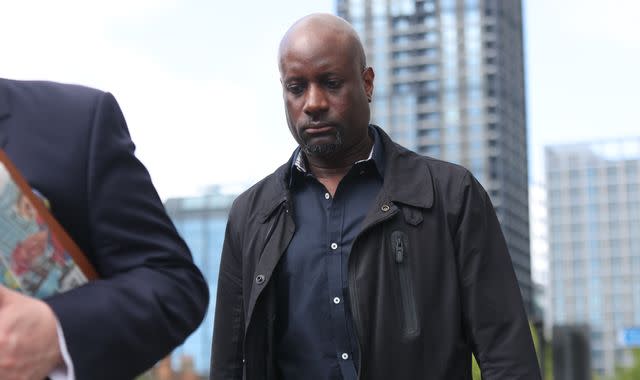Croydon: Passengers 'flung around' during deadly tram crash, court hears

Passengers were "flung around" during a tram crash in 2016 - likened by one survivor as like being inside a "washing machine" - which killed seven people and injured 51, a court has heard.
Alfred Dorris is on trial at the Old Bailey over the derailment and overturning of a tram at the Sandilands stop in Croydon, on the morning of 9 November 2016.
The incident caused 51 people to sustain injuries - 19 of whom were seriously injured.
A court has heard that Dorris was driving 70kmph (43mph) - instead of the speed limit of 20kmph (12mph) - while going around a curve - one he had previously navigated "many hundreds of occasions" prior to the crash.
The seven passengers who were killed were Dane Chinnery, Donald Collett, Robert Huxley, Philip Logan, Dorothy Rynkiewicz, Philip Sealy and Mark Smith.
Read more:
Croydon tram crash inquest: Families say 'justice has been suffocated'
Croydon tram crash: Driver may have been in 'microsleep' at time
The 49-year-old denies the charge that he allegedly failed to take reasonable care at work - of himself and passengers - under the Health and Safety at Work etc Act 1974.
He maintains, as he first said under caution in 2021, that environmental factors and infrastructure caused him to become "disoriented" and "confused" - such as signage about approaching the bend, and lighting in and around the tunnel.
Jurors heard that sleep experts suggested Mr Dorris' "disorientation" was "indicative of a micro sleep" in a "fatigued driver", and that the maximum sleep the defendant "might have had the previous evening was just over four hours".
The defendant, however, denied falling asleep at the wheel or experiencing a black out, the Old Bailey was told.
'I must have passed out'
In the immediate aftermath of the crash, several passengers went up to Mr Dorris, and saw that his eyes were shut, the court heard.
One traveller started to shout at him, to "wake up", to which the defendant responded when opening his eyes: "I must have passed out."
Joseph McKoy, a passenger, recalled Mr Dorris asking: "What's happened? I must have blacked out."
Another passenger recalled him saying: "I'm sorry guys, is everyone alright? I saw something in front of the tram."
'The tram was travelling at 70kmph'
Opening the case, prosecutor Jonathan Ashley-Norman KC said: "The tram… did not reduce speed to 20 kmph to enable it to turn safely.
"Instead, the tram was travelling at in excess of 70kmph when it entered the turn.
"At that speed it could not hope to hold the track. The inner wheels lifted from the track and the tram derailed."
He added that the latter could also have happened at 50kmph (31mph) - which is 1.5 times faster than what it was going - and that as it left the tunnel, the tram was travelling at just under 80kmph (50mph).
However, by that time, it was too late for Mr Dorris to slow down "sufficiently", the court heard.
Mr Ashley-Norman went on to say Tram 2551 "tipped on its side, causing those inside to be flung around as though, as one survivor put it, they were inside a washing machine."
Another compared the experience to being like "a ball in a pinball machine".
The prosecutor went on to describe the moment it happened, citing one passenger saying that there was a "moment of silence before the screaming and shouting".
"Windows smashed and doors were ripped off. Those who died were ejected through the broken windows and tapped between the overturned tram and the track.
"In a matter of seconds, tragedy was visited upon seven families who were bereaved, and many others who were seriously injured."
The trial at the Old Bailey - before Mr Justice Fraser and a dozen jurors - is due to go on for up to five weeks.

 Yahoo News
Yahoo News 
